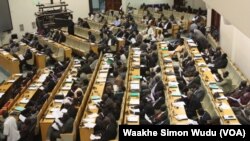International rights groups on Wednesday urged South Sudan President Salva Kiir not to sign the national security bill that was passed last week by parliament, saying it would give security forces excessive powers, and violates international and South Sudanese law.
The bill grants the National Security Service (NSS) "unqualified powers" to, among others, search suspected criminals and places, seize property connected with crimes or offences against the state, monitor communications, including broadcasting stations, and arrest suspects without a warrant, the six rights groups said in a statement.
"We believe that these powers are unconstitutional. We would like to see these powers removed from the bill,” said Elizabeth Ashamu Deng, a researcher with Amnesty International -- one of the rights groups opposed to the bill.
Human Rights Watch's Africa director, Daniel Bekele, said the "scope of the powers granted to the NSS flies in the face of international norms and South Sudan’s own constitution, which envisions a (security) service limited to intelligence activities.”
Deng said there were several other parts of the bill that also violate international law.
"The bill has not provided and guaranteed due process, such as to be informed of the reason to be arrested and charged, the right to be tried in a reasonable period of time, the right to access to a lawyer, the right to be free from torture. It is particularly concerning that the bill does not specify permissible places of detention," she said.
Experiences from other countries show that when you give security services policing powers, there is a high risk of torture and ill-treatment.Lutz Oette, REDRESS
Lutz Oette, a lawyer for international anti-torture and human rights organization REDRESS, expressed concern that if the bill is passed as is, it could lead to serious rights abuses in South Sudan.
“Experiences from other countries show that when you give security services policing powers, there is a high risk of torture and ill-treatment,” said Oette.
“This is most worrying where crucial safeguards are missing, such as the need to prohibit secret detention and to make sure that detainees are able to contact lawyers and relatives immediately upon arrest.”
Edmund Yakani, a coordinator at South Sudan’s Community Empowerment for Progress Organization (CEPO), called for the bill to "be sent back to parliament, who should amend it to remove powers for the NSS to arrest, detain, conduct searches, and seize property, and ensure oversight in line with international best practices.”
The remaining two rights organizations that signed the statement calling for the bill to be amended before it becomes law, are the Enough Project and South Sudan Action Network on Small Arms (SSANSA).
In the five-page statement, the rights groups outline numerous concerns they have with the bill, including that it fails to provide safeguards against abuse of power by the NSS and that it will create a legal framework that facilitates rights abuses.
Deng said the rights groups have asked lawmakers to amend the bill. If it lands on President Kiir's desk in its current form, Deng said he should "return it to the parliament for improvement.”
The rights groups said the bill that was passed by parliament includes some improvements on earlier versions of the draft law: among other improvements is that it provides for a complaints board and an earlier provision that would have granted security agents immunity from prosecution has been removed.
The bill was passed last week by lawmakers, although some have expressed doubt as to whether there was a quorum for the vote. An unconfirmed number of lawmakers walked out during the debate to protest the bill. South Sudan in Focus has not seen the official vote tally.
Information Minister Michael Makuei, who is the chief spokesman for the government, said Mr. Kiir will sign the bill and, "If there are any loopholes... you correct them later."

